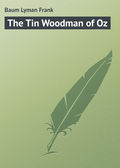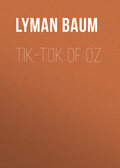
Лаймен Фрэнк Баум
Rinkitink in Oz
The Flight of the Rulers
CHAPTER 15
Now it seems that when Queen Cor fled from her island to Regos, she had wit enough, although greatly frightened, to make a stop at the royal dairy, which was near to the bridge, and to drag poor Queen Garee from the butter-house and across to Regos with her. The warriors of King Gos had never before seen the terrible Queen Cor frightened, and therefore when she came running across the bridge of boats, dragging the Queen of Pingaree after her by one arm, the woman's great fright had the effect of terrifying the waiting warriors.
"Quick!" cried Cor. "Destroy the bridge, or we are lost."
While the men were tearing away the bridge of boats the Queen ran up to the palace of Gos, where she met her husband.
"That boy is a wizard!" she gasped. "There is no standing against him."
"Oh, have you discovered his magic at last?" replied Gos, laughing in her face. "Who, now, is the coward?"
"Don't laugh!" cried Queen Cor. "It is no laughing matter. Both our islands are as good as conquered, this very minute. What shall we do, Gos?"
"Come in," he said, growing serious, "and let us talk it over."
So they went into a room of the palace and talked long and earnestly.
"The boy intends to liberate his father and mother, and all the people of Pingaree, and to take them back to their island," said Cor. "He may also destroy our palaces and make us his slaves. I can see but one way, Gos, to prevent him from doing all this, and whatever else he pleases to do."
"What way is that?" asked King Gos.
"We must take the boy's parents away from here as quickly as possible. I have with me the Queen of Pingaree, and you can run up to the mines and get the King. Then we will carry them away in a boat and hide them where the boy cannot find them, with all his magic. We will use the King and Queen of Pingaree as hostages, and send word to the boy wizard that if he does not go away from our islands and allow us to rule them undisturbed, in our own way, we will put his father and mother to death. Also we will say that as long as we are let alone his parents will be safe, although still safely hidden. I believe, Gos, that in this way we can compel Prince Inga to obey us, for he seems very fond of his parents."
"It isn't a bad idea," said Gos, reflectively; "but where can we hide the King and Queen, so that the boy cannot find them?"
"In the country of the Nome King, on the mainland away at the south," she replied. "The nomes are our friends, and they possess magic powers that will enable them to protect the prisoners from discovery. If we can manage to get the King and Queen of Pingaree to the Nome Kingdom before the boy knows what we are doing, I am sure our plot will succeed."
Gos gave the plan considerable thought in the next five minutes, and the more he thought about it the more clever and reasonable it seemed. So he agreed to do as Queen Cor suggested and at once hurried away to the mines, where he arrived before Prince Inga did. The next morning he carried King Kitticut back to Regos.
While Gos was gone, Queen Cor busied herself in preparing a large and swift boat for the journey. She placed in it several bags of gold and jewels with which to bribe the nomes, and selected forty of the strongest oarsmen in Regos to row the boat. The instant King Gos returned with his royal prisoner all was ready for departure. They quickly entered the boat with their two important captives and without a word of explanation to any of their people they commanded the oarsmen to start, and were soon out of sight upon the broad expanse of the Nonestic Ocean.
Inga arrived at the city some hours later and was much distressed when he learned that his father and mother had been spirited away from the islands.
"I shall follow them, of course," said the boy to Rinkitink, "and if I cannot overtake them on the ocean I will search the world over until I find them. But before I leave here I must arrange to send our people back to Pingaree."
Nikobob Refuses a Crown
CHAPTER 16
Almost the first persons that Zella saw when she landed from the silver-lined boat at Regos were her father and mother. Nikobob and his wife had been greatly worried when their little daughter failed to return from Coregos, so they had set out to discover what had become of her. When they reached the City of Regos, that very morning, they were astonished to hear news of all the strange events that had taken place; still, they found comfort when told that Zella had been seen in the boat of Prince Inga, which had gone to the north. Then, while they wondered what this could mean, the silver-lined boat appeared again, with their daughter in it, and they ran down to the shore to give her a welcome and many joyful kisses.
Inga invited the good people to the palace of King Gos, where he conferred with them, as well as with Rinkitink and Bilbil.
"Now that the King and Queen of Regos and Coregos have run away," he said, "there is no one to rule these islands. So it is my duty to appoint a new ruler, and as Nikobob, Zella's father, is an honest and worthy man, I shall make him the King of the Twin Islands."
"Me?" cried Nikobob, astounded by this speech. "I beg Your Highness, on my bended knees, not to do so cruel a thing as to make me King!"
"Why not?" inquired Rinkitink. "I'm a King, and I know how it feels. I assure you, good Nikobob, that I quite enjoy my high rank, although a jeweled crown is rather heavy to wear in hot weather."
"With you, noble sir, it is different," said Nikobob, "for you are far from your kingdom and its trials and worries and may do as you please. But to remain in Regos, as King over these fierce and unruly warriors, would be to live in constant anxiety and peril, and the chances are that they would murder me within a month. As I have done no harm to anyone and have tried to be a good and upright man, I do not think that I should be condemned to such a dreadful fate."
"Very well," replied Inga, "we will say no more about your being King. I merely wanted to make you rich and prosperous, as I had promised Zella."
"Please forget that promise," pleaded the charcoal-burner, earnestly; "I have been safe from molestation for many years, because I was poor and possessed nothing that anyone else could envy. But if you make me rich and prosperous I shall at once become the prey of thieves and marauders and probably will lose my life in the attempt to protect my fortune."
Inga looked at the man in surprise.
"What, then, can I do to please you?" he inquired.
"Nothing more than to allow me to go home to my poor cabin," said Nikobob.
"Perhaps," remarked King Rinkitink, "the charcoal-burner has more wisdom concealed in that hard head of his than we gave him credit for. But let us use that wisdom, for the present, to counsel us what to do in this emergency."
"What you call my wisdom," said Nikobob, "is merely common sense. I have noticed that some men become rich, and are scorned by some and robbed by others. Other men become famous, and are mocked at and derided by their fellows. But the poor and humble man who lives unnoticed and unknown escapes all these troubles and is the only one who can appreciate the joy of living."
"If I had a hand, instead of a cloven hoof, I'd like to shake hands with you, Nikobob," said Bilbil the goat. "But the poor man must not have a cruel master, or he is undone."
During the council they found, indeed, that the advice of the charcoal-burner was both shrewd and sensible, and they profited much by his words.
Inga gave Captain Buzzub the command of the warriors and made him promise to keep his men quiet and orderly – if he could. Then the boy allowed all of King Gos's former slaves, except those who came from Pingaree, to choose what boats they required and to stock them with provisions and row away to their own countries. When these had departed, with grateful thanks and many blessings showered upon the boy Prince who had set them free, Inga made preparations to send his own people home, where they were told to rebuild their houses and then erect a new royal palace. They were then to await patiently the coming of King Kitticut or Prince Inga.
"My greatest worry," said the boy to his friends, "is to know whom to appoint to take charge of this work of restoring Pingaree to its former condition. My men are all pearl fishers, and although willing and honest, have no talent for directing others how to work."
While the preparations for departure were being made, Nikobob offered to direct the men of Pingaree, and did so in a very capable manner. As the island had been despoiled of all its valuable furniture and draperies and rich cloths and paintings and statuary and the like, as well as gold and silver and ornaments, Inga thought it no more than just that they be replaced by the spoilers. So he directed his people to search through the storehouses of King Gos and to regain all their goods and chattels that could be found. Also he instructed them to take as much else as they required to make their new homes comfortable, so that many boats were loaded full of goods that would enable the people to restore Pingaree to its former state of comfort.
For his father's new palace the boy plundered the palaces of both Queen Cor and King Gos, sending enough wares away with his people to make King Kitticut's new residence as handsomely fitted and furnished as had been the one which the ruthless invaders from Regos had destroyed.
It was a great fleet of boats that set out one bright, sunny morning on the voyage to Pingaree, carrying all the men, women and children and all the goods for refitting their homes. As he saw the fleet depart, Prince Inga felt that he had already successfully accomplished a part of his mission, but he vowed he would never return to Pingaree in person until he could take his father and mother there with him; unless, indeed, King Gos wickedly destroyed his beloved parents, in which case Inga would become the King of Pingaree and it would be his duty to go to his people and rule over them.
It was while the last of the boats were preparing to sail for Pingaree that Nikobob, who had been of great service in getting them ready, came to Inga in a thoughtful mood and said:
"Your Highness, my wife and my daughter Zella have been urging me to leave Regos and settle down in your island, in a new home. From what your people have told me, Pingaree is a better place to live than Regos, and there are no cruel warriors or savage beasts there to keep one in constant fear for the safety of those he loves. Therefore, I have come to ask to go with my family in one of the boats."
Inga was much pleased with this proposal and not only granted Nikobob permission to go to Pingaree to live, but instructed him to take with him sufficient goods to furnish his new home in a comfortable manner. In addition to this, he appointed Nikobob general manager of the buildings and of the pearl fisheries, until his father or he himself arrived, and the people approved this order because they liked Nikobob and knew him to be just and honest.
As soon as the last boat of the great flotilla had disappeared from the view of those left at Regos, Inga and Rinkitink prepared to leave the island themselves. The boy was anxious to overtake the boat of King Gos, if possible, and Rinkitink had no desire to remain in Regos.
Buzzub and the warriors stood silently on the shore and watched the black boat with its silver lining depart, and I am sure they were as glad to be rid of their unwelcome visitors as Inga and Rinkitink and Bilbil were to leave.
The boy asked the White Pearl what direction the boat of King Gos had taken and then he followed after it, rowing hard and steadily for eight days without becoming at all weary. But, although the black boat moved very swiftly, it failed to overtake the barge which was rowed by Queen Cor's forty picked oarsmen.
The Nome King
CHAPTER 17
The Kingdom of the Nomes does not border on the Nonestic Ocean, from which it is separated by the Kingdom of Rinkitink and the Country of the Wheelers, which is a part of the Land of Ev. Rinkitink's country is separated from the country of the Nomes by a row of high and steep mountains, from which it extends to the sea. The Country of the Wheelers is a sandy waste that is open on one side to the Nonestic Ocean and on the other side has no barrier to separate it from the Nome Country, therefore it was on the coast of the Wheelers that King Gos landed – in a spot quite deserted by any of the curious inhabitants of that country.
The Nome Country is very large in extent, and is only separated from the Land of Oz, on its eastern borders, by a Deadly Desert that cannot be crossed by mortals, unless they are aided by the fairies or by magic.
The nomes are a numerous and mischievous people, living in underground caverns of wide extent, connected one with another by arches and passages. The word "nome" means "one who knows," and these people are so called because they know where all the gold and silver and precious stones are hidden in the earth – a knowledge that no other living creatures share with them. The nomes are busy people, constantly digging up gold in one place and taking it to another place, where they secretly bury it, and perhaps this is the reason they alone know where to find it. The nomes were ruled, at the time of which I write, by a King named Kaliko.
King Gos had expected to be pursued by Inga in his magic boat, so he made all the haste possible, urging his forty rowers to their best efforts night and day. To his joy he was not overtaken but landed on the sandy beach of the Wheelers on the morning of the eighth day.
The forty rowers were left with the boat, while Queen Cor and King Gos, with their royal prisoners, who were still chained, began the journey to the Nome King.
It was not long before they passed the sands and reached the rocky country belonging to the nomes, but they were still a long way from the entrance to the underground caverns in which lived the Nome King. There was a dim path, winding between stones and boulders, over which the walking was quite difficult, especially as the path led up hills that were small mountains, and then down steep and abrupt slopes where any misstep might mean a broken leg. Therefore it was the second day of their journey before they climbed halfway up a rugged mountain and found themselves at the entrance of the Nome King's caverns.
On their arrival, the entrance seemed free and unguarded, but Gos and Cor had been there before, and they were too wise to attempt to enter without announcing themselves, for the passage to the caves was full of traps and pitfalls. So King Gos stood still and shouted, and in an instant they were surrounded by a group of crooked nomes, who seemed to have sprung from the ground.
One of these had very long ears and was called The Long-Eared Hearer. He said: "I heard you coming early this morning."
Another had eyes that looked in different directions at the same time and were curiously bright and penetrating. He could look over a hill or around a corner and was called The Lookout. Said he: "I saw you coming yesterday."
"Then," said King Gos, "perhaps King Kaliko is expecting us."
"It is true," replied another nome, who wore a gold collar around his neck and carried a bunch of golden keys. "The mighty Nome King expects you, and bids you follow me to his presence."
With this he led the way into the caverns and Gos and Cor followed, dragging their weary prisoners with them, for poor King Kitticut and his gentle Queen had been obliged to carry, all through the tedious journey, the bags of gold and jewels which were to bribe the Nome King to accept them as slaves.
Through several long passages the guide led them and at last they entered a small cavern which was beautifully decorated and set with rare jewels that flashed from every part of the wall, floor and ceiling. This was a waiting-room for visitors, and there their guide left them while he went to inform King Kaliko of their arrival.
Before long they were ushered into a great domed chamber, cut from the solid rock and so magnificent that all of them – the King and Queen of Pingaree and the King and Queen of Regos and Coregos – drew long breaths of astonishment and opened their eyes as wide as they could.
In an ivory throne sat a little round man who had a pointed beard and hair that rose to a tall curl on top of his head. He was dressed in silken robes, richly embroidered, which had large buttons of cut rubies. On his head was a diamond crown and in his hand he held a golden sceptre with a big jeweled ball at one end of it. This was Kaliko, the King and ruler of all the nomes. He nodded pleasantly enough to his visitors and said in a cheery voice:
"Well, Your Majesties, what can I do for you?"
"It is my desire," answered King Gos, respectfully, "to place in your care two prisoners, whom you now see before you. They must be carefully guarded, to prevent them from escaping, for they have the cunning of foxes and are not to be trusted. In return for the favor I am asking you to grant, I have brought Your Majesty valuable presents of gold and precious gems."
He then commanded Kitticut and Garee to lay before the Nome King the bags of gold and jewels, and they obeyed, being helpless.
"Very good," said King Kaliko, nodding approval, for like all the nomes he loved treasures of gold and jewels. "But who are the prisoners you have brought here, and why do you place them in my charge instead of guarding them yourself? They seem gentle enough, I'm sure."
"The prisoners," returned King Gos, "are the King and Queen of Pingaree, a small island north of here. They are very evil people and came to our islands of Regos and Coregos to conquer them and slay our poor people. Also they intended to plunder us of all our riches, but by good fortune we were able to defeat and capture them. However, they have a son who is a terrible wizard and who by magic art is trying to find this awful King and Queen of Pingaree, and to set them free, that they may continue their wicked deeds. Therefore, as we have no magic to defend ourselves with, we have brought the prisoners to you for safe keeping."
"Your Majesty," spoke up King Kitticut, addressing the Nome King with great indignation, "do not believe this tale, I implore you. It is all a lie!"
"I know it," said Kaliko. "I consider it a clever lie, though, because it is woven without a thread of truth. However, that is none of my business. The fact remains that my good friend King Gos wishes to put you in my underground caverns, so that you will be unable to escape. And why should I not please him in this little matter? Gos is a mighty King and a great warrior, while your island of Pingaree is desolated and your people scattered. In my heart, King Kitticut, I sympathize with you, but as a matter of business policy we powerful Kings must stand together and trample the weaker ones under our feet."
King Kitticut was surprised to find the King of the nomes so candid and so well informed, and he tried to argue that he and his gentle wife did not deserve their cruel fate and that it would be wiser for Kaliko to side with them than with the evil King of Regos. But Kaliko only shook his head and smiled, saying:
"The fact that you are a prisoner, my poor Kitticut, is evidence that you are weaker than King Gos, and I prefer to deal with the strong. By the way," he added, turning to the King of Regos, "have these prisoners any connection with the Land of Oz?"
"Why do you ask?" said Gos.
"Because I dare not offend the Oz people," was the reply. "I am very powerful, as you know, but Ozma of Oz is far more powerful than I; therefore, if this King and Queen of Pingaree happened to be under Ozma's protection, I would have nothing to do with them."
"I assure Your Majesty that the prisoners have nothing to do with the Oz people," Gos hastened to say. And Kitticut, being questioned, admitted that this was true.
"But how about that wizard you mentioned?" asked the Nome King.
"Oh, he is merely a boy; but he is very ferocious and obstinate and he is assisted by a little fat sorcerer called Rinkitink and a talking goat."
"Oho! A talking goat, do you say? That certainly sounds like magic; and it also sounds like the Land of Oz, where all the animals talk," said Kaliko, with a doubtful expression.
But King Gos assured him the talking goat had never been to Oz.
"As for Rinkitink, whom you call a sorcerer," continued the Nome King, "he is a neighbor of mine, you must know, but as we are cut off from each other by high mountains beneath which a powerful river runs, I have never yet met King Rinkitink. But I have heard of him, and from all reports he is a jolly rogue, and perfectly harmless. However, in spite of your false statements and misrepresentations, I will earn the treasure you have brought me, by keeping your prisoners safe in my caverns."
"Make them work," advised Queen Cor. "They are rather delicate, and to make them work will make them suffer delightfully."
"I'll do as I please about that," said the Nome King sternly. "Be content that I agree to keep them safe."
The bargain being thus made and concluded, Kaliko first examined the gold and jewels and then sent it away to his royal storehouse, which was well filled with like treasure. Next the captives were sent away in charge of the nome with the golden collar and keys, whose name was Klik, and he escorted them to a small cavern and gave them a good supper.
"I shall lock your door," said Klik, "so there is no need of your wearing those heavy chains any longer." He therefore removed the chains and left King Kitticut and his Queen alone. This was the first time since the Northmen had carried them away from Pingaree that the good King and Queen had been alone together and free of all bonds, and as they embraced lovingly and mingled their tears over their sad fate they were also grateful that they had passed from the control of the heartless King Gos into the more considerate care of King Kaliko. They were still captives but they believed they would be happier in the underground caverns of the nomes than in Regos and Coregos.
Meantime, in the King's royal cavern a great feast had been spread. King Gos and Queen Cor, having triumphed in their plot, were so well pleased that they held high revelry with the jolly Nome King until a late hour that night. And the next morning, having cautioned Kaliko not to release the prisoners under any consideration without their orders, the King and Queen of Regos and Coregos left the caverns of the nomes to return to the shore of the ocean where they had left their boat.







